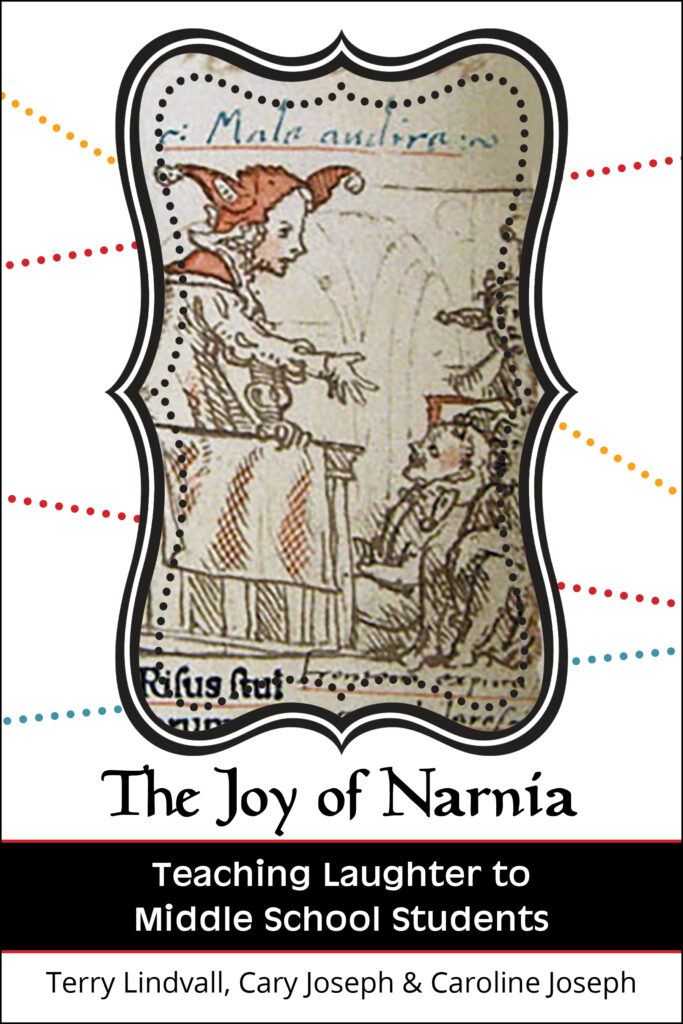
The Joy of Narnia
Teaching Laughter to Middle School Students
Terry Lindvall, Cary Joseph, and Caroline Joseph
YEAR
2024
Division
Foundations
Pricing
Price: $25.00 (Paperback & Ebook)
A university professor and two young middle school English teachers weave recent educational research on humor with examples from C.S. Lewis’s Narnia Chronicles to make a compelling case for teaching teachers how to relax and enjoy the wild things in the classroom. Using Lewis’s foundational ideas on the four sources of laughter—Joy, Fun/Play, the Joke Proper, and Flippancy—they illustrate how children begin to lose their gentle and affiliative laughter through the middle school years, often becoming mean, cruel, and cynical, and then suggest ways to counter the downward trajectory and revive the joy and fun of learning. What makes the work particularly inviting are the many practical “Tidbits” that dot the path of their learning, like crumbs leading to a happier place for students and teachers. An excellent gift for weary and heavy-laden teachers, and for parents seeking to jollify their own children.
Endorsements
“This wonderful book surveys theories of laughter from classical Greek philosophers to C. S. Lewis, suggesting how they might enhance Middle School pedagogy. Presenting insights from specialists in both psychology and physiology, it speaks to far more than teachers, however. Both communication specialists and admirers of Lewis will find The Joy of Narnia extremely rewarding. Best of all, this book practices what it preaches, providing LOL moments in and through its delightful prose. Readers will be repeatedly transported from ‘ha ha!’ to ‘Aha!’ moments: one of the many benefits of laughter provided by the authors.”
—Crystal L. Downing, PhD, Co-Director of the Marion E. Wade Center, the most comprehensive archive in the world for published and unpublished materials by and about C. S. Lewis and six of his influences (including several people quoted in The Joy of Narnia)
“Can a book be both cheerful and thought-provoking? Challenging and approachable? How about funny and yet (at the same time) serious and substantial? The Joy of Narnia embodies every one of these qualities and illustrates the many ways that C. S. Lewis’s Narnia stories do the same. I admire this book for its breadth of scholarship; I enjoyed it for its play and practicality. I heartily recommend it!”
—Diana Pavlac Glyer, PhD, Professor, the Honors College at Azusa Pacific University and author of Bandersnatch: C. S. Lewis, J. R. R. Tolkien and the Creative Collaboration of the Inklings
“The tone of Terry Lindvall and his colleagues’ The Joy of Narnia is light and entertaining, but it is also remarkably insightful. Laughter in Middle School is an important, but mostly neglected, field of study, and this practical book fills this important void. It gives significant insight into serious subjects of pedagogy, but it does so in an entertaining way. Drawing heavily from C. S. Lewis’s many books, including The Lion, the Witch, and the Wardrobe, the workbook also interrupts with many amusing and insightful examples of the authors’ own lives. This is a must read both for teachers and for students in Middle Schools.”
—Don Nilsen, PhD, Assistant Dean, Arizona State University Emeritus, Co-Founder of International Society for Humor Studies
“Funny, I think Terry Lindvall, Cary Joseph, and Caroline Joseph might be onto something here! Their new book offers a unique look at the history and impact of humor used in educational settings. As a former teacher, coach, school principal, and university faculty, I can attest to the awesome power of humor in the schoolhouse. Their book navigates the perspectives of the ancient Greek philosophers’ views on the role of humor in learning, and introduces us to contemporary educational experts like Parker Palmer, who advocate for humor as a teaching tool. They use C.S. Lewis’s Chronicles of Narnia as the backdrop to illustrate how humor can greatly enhance the educational experience for Middle and High School students. I think this work should be considered a key curriculum component for any teacher preparation program and simply put, this book is a must-read for teachers, school social workers, and anyone interested in introducing humor into the learning process.”
—Kurt Kreassig, EdD, Dean of Education, Regent University
“Let teachers know: the more children can let loose and practice the value of laughter, the more equipped they’ll be for what lies ahead.”
—Tony Hale, actor (Forky in Toy Story 4; Fear in Inside Out 2)
About the Authors

Terry Lindvall
Ph.D. University of Southern California
Terry Lindvall occupies the C. S. Lewis Chair of Communication and Christian Thought at Virginia Wesleyan University. He has taught on Communication, Theology, and Laughter (and Film) at Duke University Divinity School, Regent University, and was the Mason Fellow at the College of William and Mary. He has published fourteen books including award-winning Sanctuary Cinema (NYU Press, 2007), God Mocks (NYU Press, 2015), Divine Film Comedies (Routledge, 2016), and Animated Parables (Lexington Press, 2023). He just produced the documentary feature film, Hollywood, Teach us to Pray (2023), based on his book, God on the Big Screen (NYU Press, 2019). He once pretended for over four years to be a University President at Regent University.

Cary and Caroline Joseph
Cary Joseph (BA in English, James Madison University; MAT, James Madison University) has taught 7th grade English for seven years and now teaches at Old Donation Gifted School in Virginia Beach, Virginia. His wife, Caroline Joseph (BA in English, James Madison University, MAT, University of Virginia) taught 8th grade English for five years. She is the author of the children’s book, The Girl Who Couldn’t Laugh. They met in college when Cary noticed her license plate ERASMUS and quoted the Dutch educator to her. They have one very precocious and ebullient child, Joy, who at 6 months knew what those words meant.
